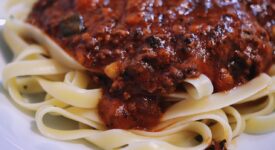Egg noodles are a type of pasta made from wheat flour, eggs, and water. This raises concerns for those who need to avoid gluten due to celiac disease or gluten sensitivity. While egg noodles contain gluten, the amount of gluten varies depending on the recipe and the brand. Those with mild gluten sensitivity may find that they can tolerate small amounts of gluten in egg noodles. However, those with a higher sensitivity to gluten should avoid egg noodles or choose a gluten-free alternative.
For those who need to follow a gluten-free diet, there are many alternatives to egg noodles available. Rice noodles, quinoa pasta, and gluten-free pasta blends are some popular options. When cooking with egg noodles, it is important to check the label for any hidden sources of gluten and to be cautious when eating egg noodles at restaurants or in pre-prepared meals.
Overall, whether or not egg noodles are safe for those with gluten sensitivity depends on the individual’s level of sensitivity. It is important to read labels carefully and consider alternative options when necessary.
What Are Egg Noodles?
Egg noodles are a popular type of pasta that is widely used in cooking, especially in Italian and Asian cuisine. These noodles are made by combining wheat flour, egg, and water. Wheat flour forms the base of this noodle, but it contains eggs, which provide a unique flavor and texture to the noodles.
The dough is rolled out, cut into thin strips, and then dried. Once dried, the noodles can be stored for a long time. When it comes to cooking egg noodles, they are typically boiled for a few minutes until they are al dente. These noodles are versatile and can be used in many dishes, such as soups, salads, or as a side dish.
One thing to keep in mind for those with gluten sensitivity is that egg noodles are made from wheat flour and, therefore, may contain gluten. It’s important to check the label and opt for gluten-free alternatives if needed. However, for those without gluten sensitivity, egg noodles can be a tasty addition to many dishes.
Gluten-Free Diets
Gluten-free diets have become increasingly popular in recent years, not only in individuals with medical conditions like celiac disease or gluten sensitivity but also in individuals seeking a healthier lifestyle. The main reason for following a gluten-free diet is to avoid gluten, a protein found in many grains, including wheat, barley, and rye. Those with celiac disease or gluten sensitivity must follow a strict gluten-free diet to prevent digestive issues and other symptoms.
However, it is important to note that following a gluten-free diet can be challenging as many foods, including processed and packaged foods, may contain hidden sources of gluten. Therefore, it is important to read labels carefully and choose naturally gluten-free foods like fruits, vegetables, meats, and fish. There are also many gluten-free products available in stores, including gluten-free pasta alternatives to egg noodles, like rice noodles, quinoa pasta, and gluten-free pasta blends.
Gluten in Egg Noodles
Egg noodles are a popular type of pasta that many people love to eat, but for those following a gluten-free diet, there arises a question – are egg noodles gluten-free? Made from a simple mixture of wheat flour, eggs, and water, egg noodles are a staple food in many cuisines across the world, including Italian and Asian.
For those with celiac disease or gluten sensitivity, a gluten-free diet is a medical requirement. Gluten, a protein found in wheat, barley, and rye, can cause digestive issues and several health problems for those with these conditions. While egg noodles contain wheat flour, a source of gluten, they may not contain enough gluten to cause problems for those with mild gluten sensitivity.
However, it is crucial to note that highly sensitive individuals should avoid egg noodles or opt for a gluten-free alternative. Several types of gluten-free pasta are available that can be substituted for egg noodles, such as rice noodles, quinoa pasta, or gluten-free pasta blends.
If you choose to use egg noodles in your cuisine, make sure to check the label thoroughly to avoid hidden sources of gluten. It is also advisable to exercise caution when eating egg noodles at restaurants or consuming pre-prepared meals, as they may contain gluten.
In conclusion, for those following a gluten-free diet, the safety of consuming egg noodles may depend on their level of gluten sensitivity. Always read the label carefully and consider gluten-free alternatives when necessary.
Gluten-Free Egg Noodle Alternatives
If you need to follow a gluten-free diet but still want to enjoy pasta dishes, there are many gluten-free alternatives to egg noodles available. Rice noodles, made from rice flour and water, are a popular choice and can be found in many Asian grocery stores. Quinoa pasta, made from quinoa flour, is another great option and has a similar texture to wheat-based pasta. Gluten-free pasta blends, made from a mixture of different gluten-free flours, offer a wider range of pasta shapes for cooking.
When selecting gluten-free pasta, it is important to check the ingredients list to ensure it does not contain any hidden sources of gluten. Some brands may use wheat starch or other gluten-containing ingredients, so it is essential to do your research before purchasing. As with all gluten-free products, it is also important to check for any cross-contamination with gluten during the manufacturing process.
Experiment with different gluten-free alternatives to find which ones you like best in your favorite pasta dishes. With so many options available, there is no need to sacrifice flavor or texture when following a gluten-free diet.
Cooking with Egg Noodles
When cooking with egg noodles, it is important to carefully read labels to ensure that they do not contain any gluten. Some egg noodle brands may add additional ingredients to their noodles, which could contain gluten. Additionally, when eating egg noodles at a restaurant or in pre-prepared meals, it is important to inquire about gluten-free options, as these meals may contain hidden sources of gluten.
If you are unsure if a particular brand of egg noodles is gluten-free, there are many gluten-free pasta alternatives available such as rice noodles or quinoa pasta blends. These alternatives offer a safe and delicious option for those with gluten sensitivities or celiac disease.
When cooking with egg noodles, it is also important to note that overcooking can cause the noodles to become mushy or break apart. Be sure to follow cooking instructions carefully to ensure the best texture and flavor.
In conclusion, while egg noodles may contain gluten, they can still be enjoyed by those with mild gluten sensitivity. However, for those with celiac disease or severe gluten sensitivities, it is important to choose gluten-free alternatives and to be cautious when eating egg noodles outside of the home.
Conclusion
Overall, egg noodles can be a safe choice for those who need to follow a gluten-free diet, depending on their sensitivity to gluten. It is important to carefully read the labels of egg noodle products as they may contain hidden sources of gluten. For those who are highly sensitive to gluten, gluten-free pasta alternatives like rice noodles, quinoa pasta, or gluten-free pasta blends are a good option.
When eating out or choosing pre-prepared meals, be aware that egg noodles may be used and contain gluten. It is always best to ask about the ingredients and cooking methods for any dish if you are unsure.
The key takeaway is to make sure to be aware of your own level of gluten sensitivity, read labels carefully, and consider gluten-free alternatives when necessary. With these precautions, egg noodles can be part of a delicious and safe gluten-free diet.








